Setting aside their usual bickering, South Korean liberal and conservative parties on Thursday vowed to cooperate to help the Seoul government prevail in an escalating trade row with Japan.
After a meeting between the parties' leaders and South Korean President Moon Jae-in at Seoul's presidential office, they announced plans to create a "pan-national" emergency body to respond to tighter Japanese trade controls on certain technology exports to South Korea.
Click to Gallery
Setting aside their usual bickering, South Korean liberal and conservative parties on Thursday vowed to cooperate to help the Seoul government prevail in an escalating trade row with Japan.
South Korean political leaders urged Japan to immediately withdraw the measures they described as "unjust economic retaliation" that would seriously harm bilateral relations and cooperation.
"Japan's export restriction measures are an unjust economic retaliation that violates the order of free trade and seriously damages friendly and mutually beneficial relationships between South Korea and Japan," the South Korean parties and presidential Blue House said in a joint statement after the meeting.
"The government doesn't have concrete plans and is just appealing to the emotions of our people with words. However, words and emotions cannot solve this problem," Hwang said. "Core issues should be resolved between the leaders of both countries ... I think the president should solve this with a top-down approach."
Tokyo said the issue has nothing to do with historical issues between the countries and says the materials affected by the export controls can be sent only to trustworthy trading partners. Without presenting specific examples, it has questioned Seoul's credibility in controlling the exports of arms and items that can be used both for civilian and military purposes.
The meeting came amid growing concerns in South Korea that Japan's trade curbs, which could possibly be expanded to hundreds of trade items in coming weeks, would rattle its export-dependent economy.
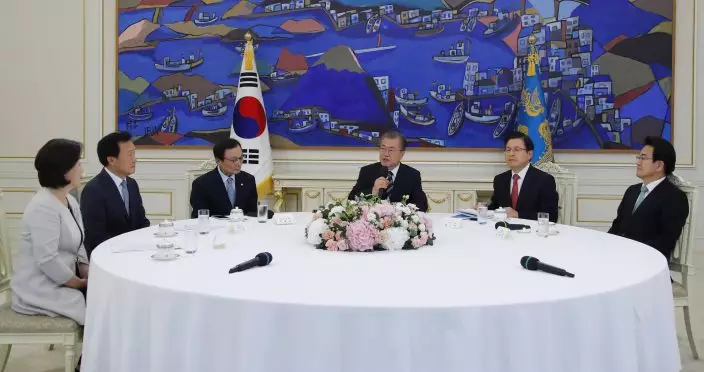
South Korean President Moon Jae-in, third from right, speaks during a meeting with ruling and opposition party leaders to talk about an ongoing South Korea-Japan trade conflict at the presidential Blue House in Seoul, South Korea, Thursday, July 18, 2019. (Bee Jae-manYonhap via AP)
South Korean political leaders urged Japan to immediately withdraw the measures they described as "unjust economic retaliation" that would seriously harm bilateral relations and cooperation.
The leaders of conservative parties also called for Moon to take more aggressive diplomatic steps, such as pushing for a summit with Japanese Prime Minister Shinzo Abe or sending a special envoy to Japan.
Earlier on Thursday, South Korea's central bank lowered its policy rate for the first time in three years to combat a faltering economy that faces further risks created by the trade row with Japan.
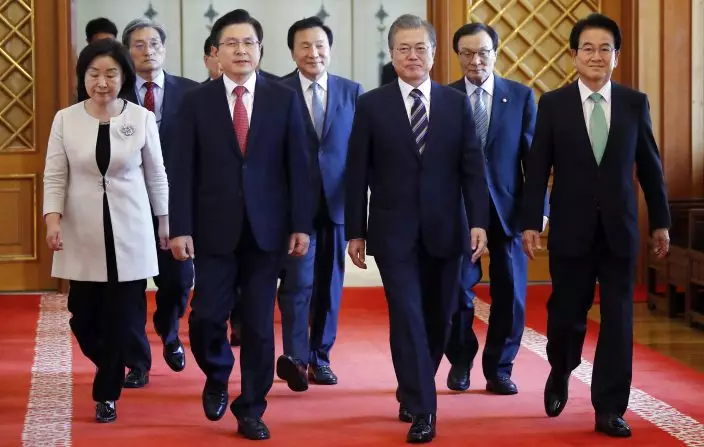
South Korean President Moon Jae-in, third from right, walks with ruling and opposition party leaders to attend a meeting to talk about an ongoing South Korea-Japan trade conflict at the presidential Blue House in Seoul, South Korea, Thursday, July 18, 2019. (Bee Jae-manYonhap via AP)
"Japan's export restriction measures are an unjust economic retaliation that violates the order of free trade and seriously damages friendly and mutually beneficial relationships between South Korea and Japan," the South Korean parties and presidential Blue House said in a joint statement after the meeting.
Moon during the meeting said that a united front between the government and political parties would "send a good message to Japan and increase the negotiation leverage of our government and companies."
Hwang Kyo-ahn, leader of the conservative Liberty Korea Party, called for Moon to push for a quick meeting with Abe or send high-level special envoys to Tokyo and Washington, a treaty ally with both Asian nations, to help resolve the standoff.
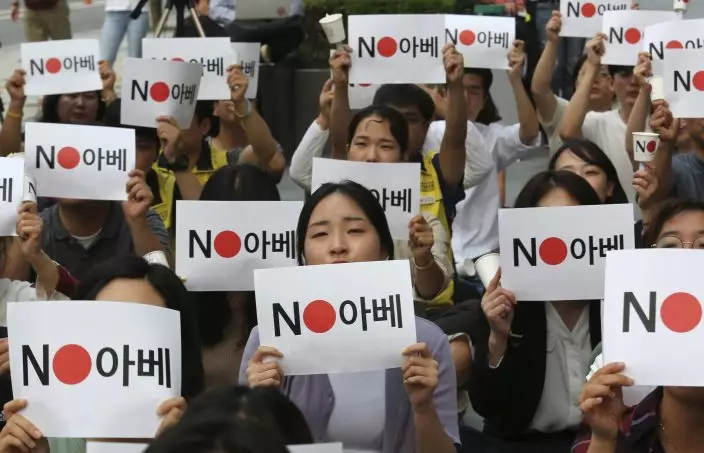
Protesters stage a rally denouncing the Japanese government's decision on their exports to South Korea in front of the Japanese embassy in Seoul, South Korea, Thursday, July 18, 2019. The signs read: " No Abe (Japanese Prime Minister Shinzo Abe)." (AP PhotoAhn Young-joon)
"The government doesn't have concrete plans and is just appealing to the emotions of our people with words. However, words and emotions cannot solve this problem," Hwang said. "Core issues should be resolved between the leaders of both countries ... I think the president should solve this with a top-down approach."
The dispute erupted earlier this month when Tokyo tightened controls on the exports of photoresists and two other chemicals to South Korean companies that use them to produce semiconductors and display screens for smartphones and TVs.
Seoul has accused Tokyo of weaponizing trade to retaliate against South Korean court rulings calling for Japanese companies to compensate aging South Korean plaintiffs for forced labor during World War II, and plans to file a complaint with the World Trade Organization.
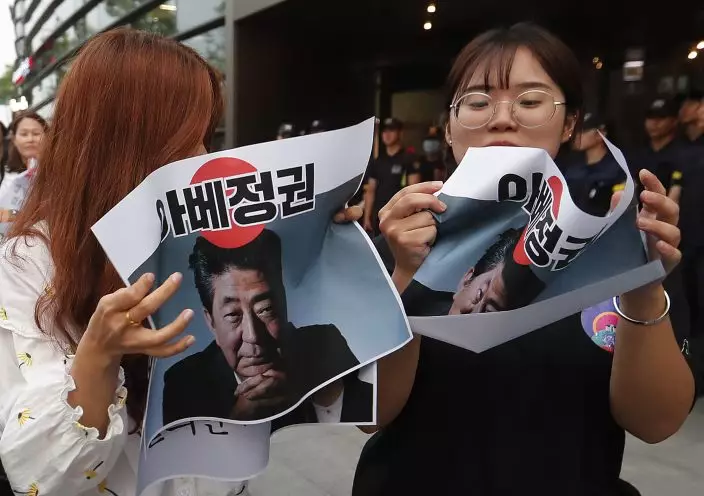
Protesters deface papers showing images of Japanese Prime Minister Shinzo Abe during a rally denouncing Japanese government's decision on their exports to South Korea, in front of the Japanese embassy in Seoul, South Korea, Thursday, July 18, 2019. The signs read: "Abe's government." (AP PhotoAhn Young-joon)
Tokyo said the issue has nothing to do with historical issues between the countries and says the materials affected by the export controls can be sent only to trustworthy trading partners. Without presenting specific examples, it has questioned Seoul's credibility in controlling the exports of arms and items that can be used both for civilian and military purposes.
South Korea has rejected the Japanese claims and proposed an inquiry by the United Nations Security Council or another international body on the export controls of both countries.
South Korea is also bracing for the possibility that Japan will take further steps by removing it from a 27-country "whitelist" receiving preferential treatment in trade.
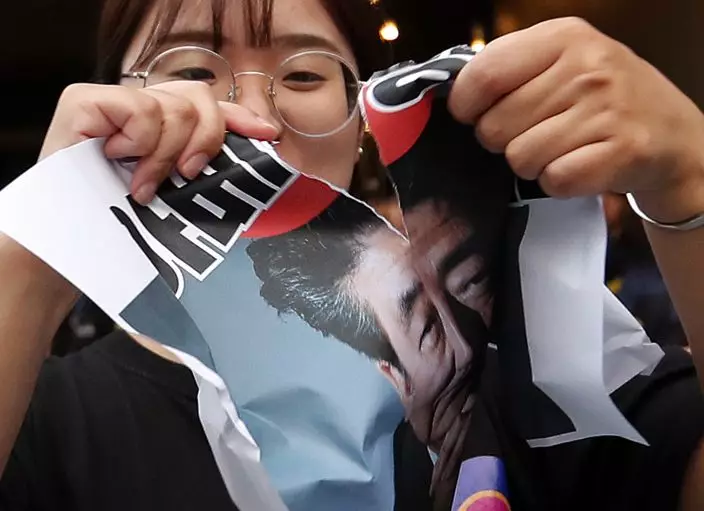
A protester tears an image of Japanese Prime Minister Shinzo Abe during a rally denouncing Japanese government's decision on their exports to South Korea, in front of the Japanese embassy in Seoul, South Korea, Thursday, July 18, 2019. (AP PhotoAhn Young-joon)
Its removal from the list would require Japanese companies to apply for case-by-case approvals for exports to South Korea of hundreds of items deemed sensitive, not just the three materials affected by the trade curbs that took effect July 4. It will also allow Japanese authorities to restrict any export to South Korea when they believe there are security concerns.
"The Japanese government should immediately withdraw its economic retaliation measure and clearly understand that additional measures such as the removal from the whitelist would threaten South Korea-Japan relations and the security cooperation in Northeast Asia," said Choi Do-ja, spokeswoman of the conservative Bareun Mirae Party.
DETROIT (AP) — The Oakland Athletics no longer have to wonder where they'll play the next few seasons. That won't make the long goodbye any easier.
The A's reacted to the announcement that this will be their last year in Oakland with a mixture of sadness and relief.
“At least as a player, you know where you’re headed,” outfielder Seth Brown said Friday before a game against the Tigers in Detroit. “There’s obviously a lot of moving parts, a lot of stuff we’re not privy to, so it’s just been kind of a waiting game on our end. Where are we going to go? Where are we going to be? So I think just having that knowledge -- at least we know where we’re going to be playing next year.”
Vivek Ranadivé, who owns the Triple-A Sacramento River Cats, and Oakland Athletics owner John Fisher announced Thursday that the A’s will temporarily relocate to West Sacramento's Sutter Health Park for at least three seasons. The A's are moving to Las Vegas after a new ballpark is constructed.
The River Cats, who are affiliated with the San Francisco Giants, will continue to play at the same facility.
Fisher was unable to reach an agreement with Oakland city officials on extending the lease at Oakland Coliseum, which expires at the end of this season. The A's have played in the city since 1968.
“There's direction now, which we've talked a lot about,” Oakland A's manager Mark Kotsay said. “We've got time to kind of reflect on what this really means from an organizational standpoint, the history that we've had in Oakland, with this being now the final season. There's a lot of emotion that goes behind this.”
It will not only cause some upheaval for the players and staff but also members of the organization that work behind the scenes.
“At the end of the day, we know where we're going to be for the next three seasons after the finish this year and that in itself gives a little bit of stability,” Kotsay said. “At the same time, in the present, it's challenging in certain ways to think about the finality of this organization in Oakland.”
Sacramento will be a much smaller environment to house a major league team. Ranadivé said the River Cats venue currently seats 16,000 when counting the stands, the lawn behind center field and standing room only.
First baseman Ryan Noda is concerned with the facilities. He's hopeful that significant upgrades will be made, much like the Toronto Blue Jays did at Buffalo's Triple-A facility. The Blue Jays played at Buffalo's Sahlen Field in 2020 in 2021 during the COVID-19 pandemic.
“New walls, new dugouts, new locker rooms — everything they needed to become a big league stadium,” said Noda, who played some games in Sacramento as a minor leaguer. “As long as we can do something like that, then it'll be all right. But it's definitely going to be different than playing in stadiums that hold 40,000 people.”
Kotsay is confident the upgrades will occur.
“I know it will be of major league baseball quality,” he said. “It's has to be of major league baseball quality. I know the Players Association will make sure that takes place, as they did in Buffalo.”
For the rest of this season, the A's will have to deal with small home crowds and disappointed fans.
“We’re sad for the fans, the diehard fans, who always come to our games, always support us, always support the boys wearing the jersey,” Noda said.
AP MLB: https://apnews.com/hub/mlb
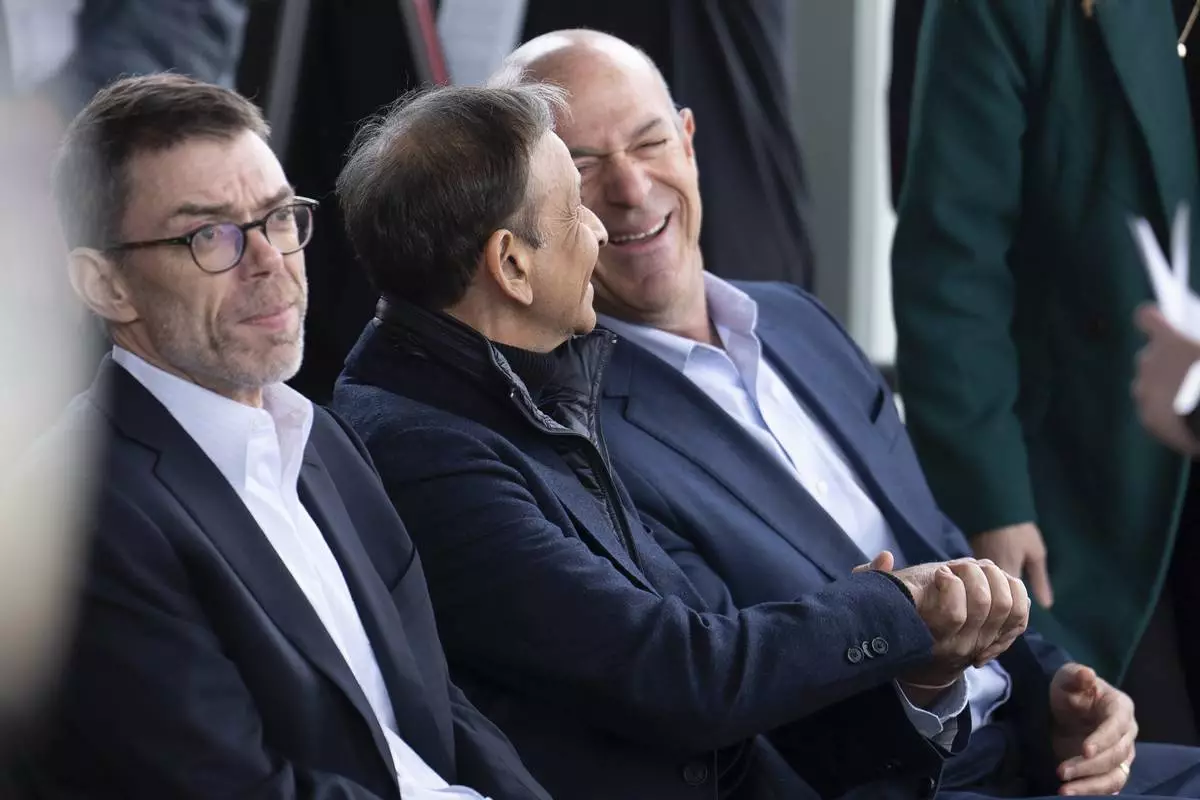
Sacramento Kings owner Vivek Ranadive, center, shakes hands John Fisher, owner of the Oakland Athletics, before the start of a news conference where Fisher announced his team will leave Oakland after this season and play temporarily at a minor league park, during a news conference in West Sacramento, Calif., Thursday, April 4 2024.The A's announced the decision to play at the home of the Sacramento River Cats from 2025-27 with an option for 2028 on Thursday after being unable to reach an agreement to extend their lease in Oakland during that time. (AP Photo/Rich Pedroncelli)

John Fisher, owner of the Oakland Athletics baseball team, announces that his team will leave Oakland after this season and play temporarily at a minor league park, during a news conference in West Sacramento, Calif., Thursday, April 4, 2024. The A's announced the decision to play at the home of the Sacramento River Cats from 2025-27 with an option for 2028 on Thursday after being unable to reach an agreement to extend their lease in Oakland during that time. (AP Photo/Rich Pedroncelli)
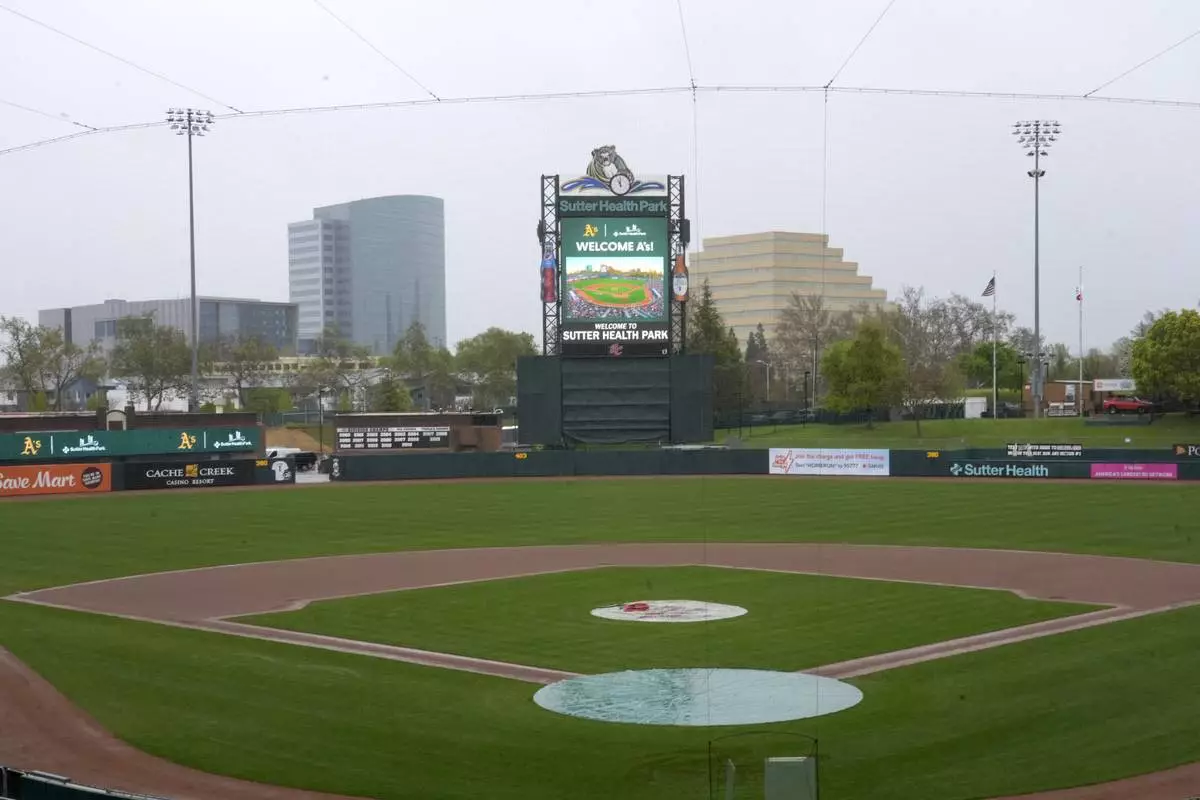
Sutter Health Park, home of the Triple A team Sacramento River Cats, is shown in West Sacramento, Calif., Thursday, April 4, 2024. The Oakland Athletics announced the decision to play at the home of the Sacramento River Cats from 2025-27 with an option for 2028 on Thursday after being unable to reach an agreement to extend their lease in Oakland during that time. (AP Photo/Rich Pedroncelli)
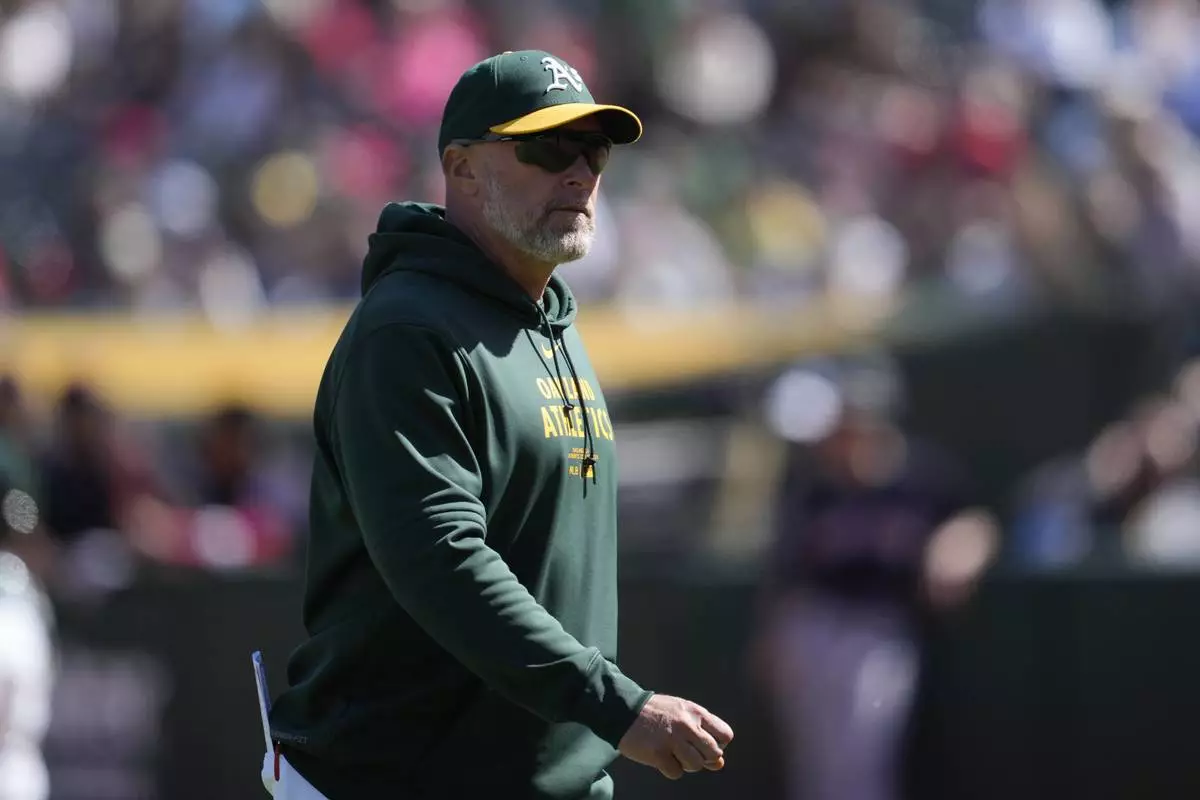
Oakland Athletics manager Mark Kotsay walks to the dugout after making a pitching change during the eighth inning of the team's baseball game against the Cleveland Guardians in Oakland, Calif., Sunday, March 31, 2024. (AP Photo/Jeff Chiu)











